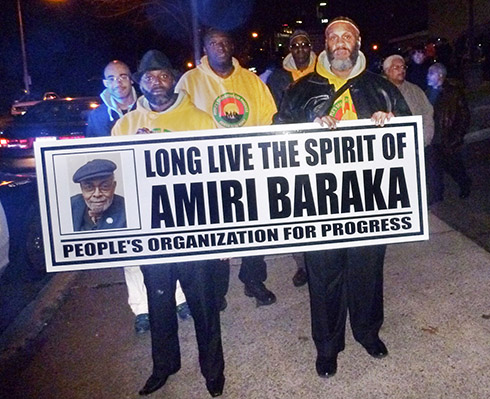Amiri Baraka, the great African-American poet and playwright, died on January 9th, 2014, at the age of 79. I first learned of him when I was in Reims, France, more than thirty-five years ago, in an article in the weekly magazine Le Nouvel Observateur.

The wake of Amiri Baraka in Newark, New Jersey.
The journal, voice of the elite French intellectual left, portrayed an anti-establishment poet and playwright who had no qualms rocking the boat of the unjust order of things in the United States. He was then known as Leroi Jones, a young rebel from the United States black urban centers.
After emigrating to the United States, I became further acquainted with him through the Liberation Poets Collective, whose ranks include many friends of Amiri Baraka, such as Askia Touré, Brenda Walcott, Aldo Tambellini, Everett Hoagland, Tony Medina, and Tony Menelik Van Der Meer. Most of these poets knew Baraka since the 1960s, during the heyday of the Black Arts Movement in New York City.
I met Baraka in person for the first time in 2006 during a tribute to him organized in Roxbury, Massachusetts, by the Cultural Café. He looked tired and older than I expected at first sight, but when his turn came to address the audience he was vibrant, his voice forceful, animated by a kind of hidden energy suddenly propelled to stir things up. He talked about his poetry, past shared anecdotes with his friends, and the need to continue the struggle.
After the tribute, Aldo Tambellini (with whom I had come to the event), asked me to join him, Askia Touré, Tony Van Deer Meer, Baraka, and a couple of other poets to have dinner in a restaurant in Boston’s Chinatown. I was happy for the opportunity this offered me to hang out with Baraka, whom I considered one of the greatest voices of liberation poetry. I saw him again a couple of years later during a visit to Boston. I offered to send him a copy of our Collective’s newly released anthology Poets Against the Killing Fields, which Askia had promised him.
Baraka’s funeral was an occasion of comradesque brotherhood among Askia Touré, Everett Hoagland, Tony Van Der Meer, and the author of this text, who made the trip from Boston to Newark together in a rented car. It was during this trip, taken in part to cover the event for Tanbou, that I conceived the idea of writing a collage-reportage poem instead of a memoir-like essay as I first envisioned.
The trip was pleasant and relaxing although permeated by the saddening spell of Amiri’s death. My three companions, all close friends of the departed poet, exchanged memories, anecdotes, moments each had shared with him, expressing their feelings, opinions and jokes as freely as the liberated poets they are.
At the funeral, Askia Touré was treated like a rock star, as one of us joked, so well-known and beloved he was among the thousands of mourners. The inner circle of Amiri Baraka and the Black Arts Movement, comprising elements of the black civil rights movement and revolutionary struggle that spanned the East Coast to the West Coast, the North and South of the United States, were there in force; they all seemed to have missed Brother Askia Touré, and he missed them too. He misses particularly his brother in arms Amiri, telling me: “I still cannot come to terms with the realization that he is no longer among us, no longer there as my friend.” I didn’t say anything, knowing that in moments like this one, silence best expresses their poignancy.
Thanks to Askia’s special status I was admitted to the VIP section of the funeral, the section where family and friends, and friends of friends were given a ticket to the meal, a Southern cuisine cordon bleu feast. It was the best moment for the reunion of the old guard of the US black literary and liberation movement.
I was pleased I went to the funeral to pay my respects to Brother Amiri Baraka’s memory. Giants like him come only in a handful in every country, in every century. His legacy is that power is within the reach of us all. If we yell high and loud enough. That’s a very important lesson.
(See in the poetry section my poem on Amiri Baraka “The Elevation of the Better Barack” and also more pictures from the funeral.)
